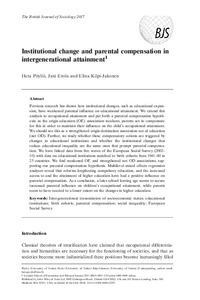Institutional Change and Parental Compensation in Intergenerational Attainment
Pöyliö Heta; Erola Jani; Kilpi-Jakonen Elina
Institutional Change and Parental Compensation in Intergenerational Attainment
Pöyliö Heta
Erola Jani
Kilpi-Jakonen Elina
John Wiley & Sons Ltd
Julkaisun pysyvä osoite on:
https://urn.fi/URN:NBN:fi-fe2021042717629
https://urn.fi/URN:NBN:fi-fe2021042717629
Tiivistelmä
Previous research has shown how institutional changes, such as educational expansion,
have weakened parental influence on educational attainment. We extend this
analysis to occupational attainment and put forth a parental compensation hypothesis:
as the origin-education (OE) association weakens, parents act to compensate
for this in order to maintain their influence on the child’s occupational attainment.
We should see this as a strengthened origin-destination association net of education
(net OD). Further, we study whether these compensatory actions are triggered by
changes in educational institutions and whether the institutional changes that
reduce educational inequality are the same ones that prompt parental compensation.
We have linked data from five waves of the European Social Survey (2002–
10) with data on educational institutions matched to birth cohorts born 1941–80 in
25 countries. We find weakened OE and strengthened net OD associations, supporting
our parental compensation hypothesis. Multilevel mixed effects regression
analyses reveal that reforms lengthening compulsory education, and the increased
access to and the attainment of higher education have had a positive influence on
parental compensation. As a conclusion, a later school leaving age seems to secure
increased parental influence on children’s occupational attainment, while parents
seem to have reacted to a lesser extent on the changes in higher education.
have weakened parental influence on educational attainment. We extend this
analysis to occupational attainment and put forth a parental compensation hypothesis:
as the origin-education (OE) association weakens, parents act to compensate
for this in order to maintain their influence on the child’s occupational attainment.
We should see this as a strengthened origin-destination association net of education
(net OD). Further, we study whether these compensatory actions are triggered by
changes in educational institutions and whether the institutional changes that
reduce educational inequality are the same ones that prompt parental compensation.
We have linked data from five waves of the European Social Survey (2002–
10) with data on educational institutions matched to birth cohorts born 1941–80 in
25 countries. We find weakened OE and strengthened net OD associations, supporting
our parental compensation hypothesis. Multilevel mixed effects regression
analyses reveal that reforms lengthening compulsory education, and the increased
access to and the attainment of higher education have had a positive influence on
parental compensation. As a conclusion, a later school leaving age seems to secure
increased parental influence on children’s occupational attainment, while parents
seem to have reacted to a lesser extent on the changes in higher education.
Kokoelmat
- Rinnakkaistallenteet [29337]
